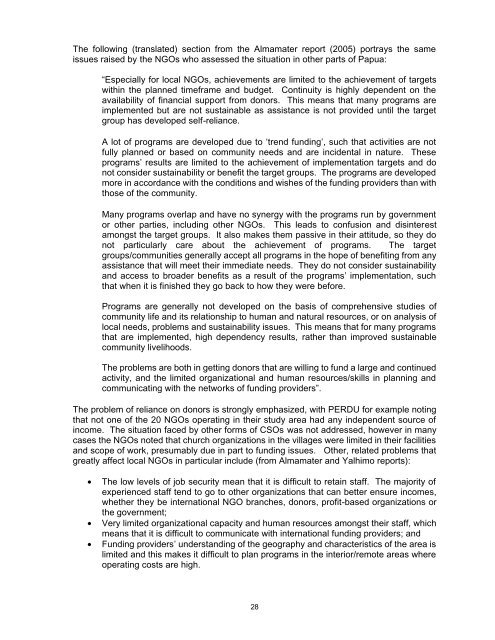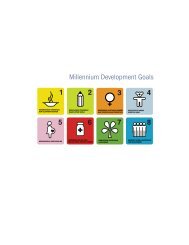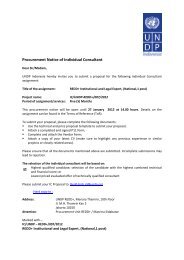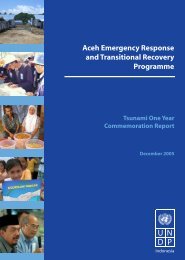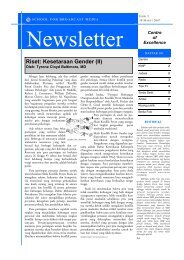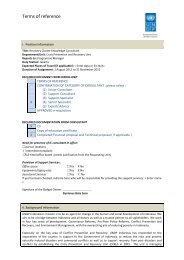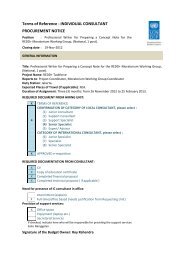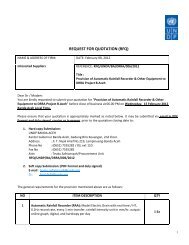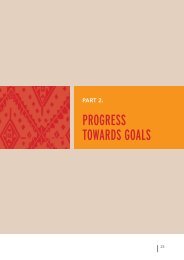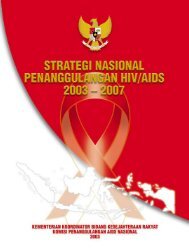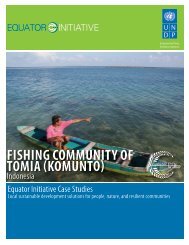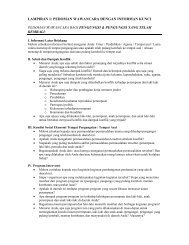Community Livelihoods And Civil Society Organisations In - UNDP
Community Livelihoods And Civil Society Organisations In - UNDP
Community Livelihoods And Civil Society Organisations In - UNDP
You also want an ePaper? Increase the reach of your titles
YUMPU automatically turns print PDFs into web optimized ePapers that Google loves.
The following (translated) section from the Almamater report (2005) portrays the same<br />
issues raised by the NGOs who assessed the situation in other parts of Papua:<br />
“Especially for local NGOs, achievements are limited to the achievement of targets<br />
within the planned timeframe and budget. Continuity is highly dependent on the<br />
availability of financial support from donors. This means that many programs are<br />
implemented but are not sustainable as assistance is not provided until the target<br />
group has developed self-reliance.<br />
A lot of programs are developed due to ‘trend funding’, such that activities are not<br />
fully planned or based on community needs and are incidental in nature. These<br />
programs’ results are limited to the achievement of implementation targets and do<br />
not consider sustainability or benefit the target groups. The programs are developed<br />
more in accordance with the conditions and wishes of the funding providers than with<br />
those of the community.<br />
Many programs overlap and have no synergy with the programs run by government<br />
or other parties, including other NGOs. This leads to confusion and disinterest<br />
amongst the target groups. It also makes them passive in their attitude, so they do<br />
not particularly care about the achievement of programs. The target<br />
groups/communities generally accept all programs in the hope of benefiting from any<br />
assistance that will meet their immediate needs. They do not consider sustainability<br />
and access to broader benefits as a result of the programs’ implementation, such<br />
that when it is finished they go back to how they were before.<br />
Programs are generally not developed on the basis of comprehensive studies of<br />
community life and its relationship to human and natural resources, or on analysis of<br />
local needs, problems and sustainability issues. This means that for many programs<br />
that are implemented, high dependency results, rather than improved sustainable<br />
community livelihoods.<br />
The problems are both in getting donors that are willing to fund a large and continued<br />
activity, and the limited organizational and human resources/skills in planning and<br />
communicating with the networks of funding providers”.<br />
The problem of reliance on donors is strongly emphasized, with PERDU for example noting<br />
that not one of the 20 NGOs operating in their study area had any independent source of<br />
income. The situation faced by other forms of CSOs was not addressed, however in many<br />
cases the NGOs noted that church organizations in the villages were limited in their facilities<br />
and scope of work, presumably due in part to funding issues. Other, related problems that<br />
greatly affect local NGOs in particular include (from Almamater and Yalhimo reports):<br />
• The low levels of job security mean that it is difficult to retain staff. The majority of<br />
experienced staff tend to go to other organizations that can better ensure incomes,<br />
whether they be international NGO branches, donors, profit-based organizations or<br />
the government;<br />
• Very limited organizational capacity and human resources amongst their staff, which<br />
means that it is difficult to communicate with international funding providers; and<br />
• Funding providers’ understanding of the geography and characteristics of the area is<br />
limited and this makes it difficult to plan programs in the interior/remote areas where<br />
operating costs are high.<br />
28


